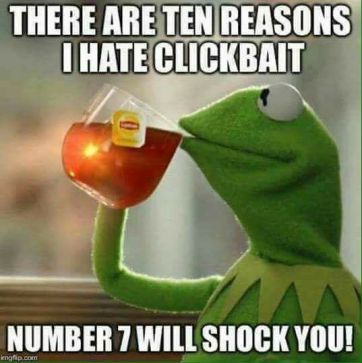It seems like not long ago when we wanted to know if something we saw on the news was real, we could use the internet to  verify it’s authenticity and accuracy. With the advent of Clickbait, No News and Fake News, those days are gone.
verify it’s authenticity and accuracy. With the advent of Clickbait, No News and Fake News, those days are gone.
According to Wikipedia, “Clickbait is a pejorative term for web content whose main goal is to get users to click on a link to go to a certain webpage.” Headlines which include phrases like, “You won’t believe…” or “What happens next will shock you” are used to raise your curiosity and get you to click the link to a no-news or fake news article that will, in most cases, lead to disappointment.
Lo-tech versions of clickbait are sensational headlines which have been around since the dawn of mass media. As a matter of fact, I regularly try to create interesting subject lines for our regular online updates.  A catchy subject line which leaves the reader curious and wanting to know more can improve our readership rates as much as 30 to 50 percent. So not all clickbait is bad, but take a look at the clickbait here regarding Stockard Channing from the movie Grease. Using words like weird and dramatically different, the journalist of this clickbait no-news article is trying to get you to click on the link to find out what could have gone wrong with this famous personality who was already 34 years old when she famously played the role of Rizzo. The headline writer is not expecting you to consider the question,
A catchy subject line which leaves the reader curious and wanting to know more can improve our readership rates as much as 30 to 50 percent. So not all clickbait is bad, but take a look at the clickbait here regarding Stockard Channing from the movie Grease. Using words like weird and dramatically different, the journalist of this clickbait no-news article is trying to get you to click on the link to find out what could have gone wrong with this famous personality who was already 34 years old when she famously played the role of Rizzo. The headline writer is not expecting you to consider the question,  “Who doesn’t look dramatically different after 40 years?!”
“Who doesn’t look dramatically different after 40 years?!”
Long before Donald Trump was griping about fake news, Ukraine was battling the blight. Russia has been using fake news in its campaign against Ukraine for years (that’s a fact) and I suspect Russia is in some ways  involved with a lot of the fake news we are seeing in America currently (that’s just a hunch). The word fake has been adapted into the modern Ukrainian & Russian vernacular (Фейк) whenever false news shows up in the media or social media like Facebook. Fortunately, Ukrainians are taking steps to protect themselves and inform the world about Russia’s fake news assault. So I’d like to introduce you to the news agency in Ukraine that is dedicated solely to the purpose of stopping the aggression of Russian fake news, Stop Fake (Стоп Фейк). Fortunately they publish their findings in both English and Russian and 9 other languages. Here’s the latest English language edition (below):
involved with a lot of the fake news we are seeing in America currently (that’s just a hunch). The word fake has been adapted into the modern Ukrainian & Russian vernacular (Фейк) whenever false news shows up in the media or social media like Facebook. Fortunately, Ukrainians are taking steps to protect themselves and inform the world about Russia’s fake news assault. So I’d like to introduce you to the news agency in Ukraine that is dedicated solely to the purpose of stopping the aggression of Russian fake news, Stop Fake (Стоп Фейк). Fortunately they publish their findings in both English and Russian and 9 other languages. Here’s the latest English language edition (below):
